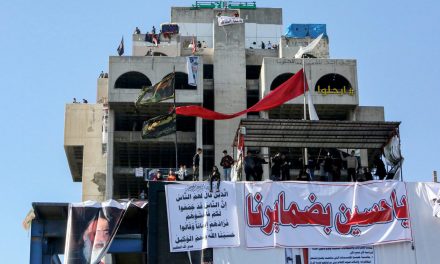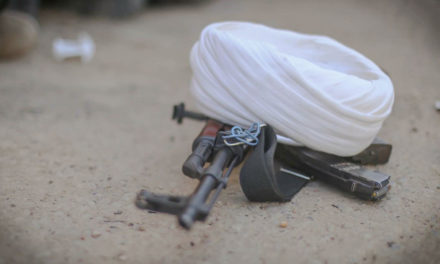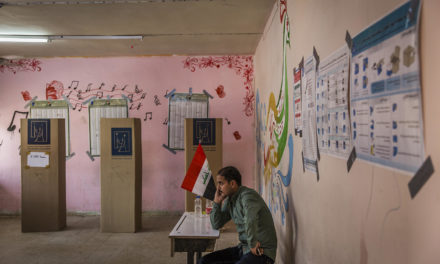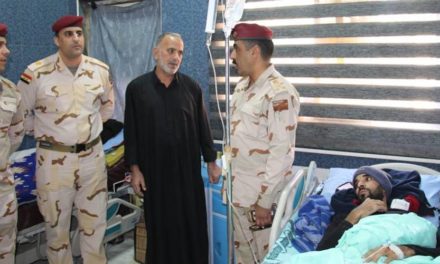The COVID-19 pandemic has put the Iraqi state in a challenging situation. While official figures are relatively low in comparison to neighbouring countries, any large increase in the number of infections will likely mean the inability of Iraq’s healthcare to cope with the crisis at hand. This would result in growing criticism from Iraqis over government action to combat the virus. Nevertheless, the state will remain important for all Iraqis to overcome this chapter, and no one will benefit from its failure.
The geography of COVID-19 in Iraq shows us that this epidemic is currently spreading and concentrating in the capital and other populated cities from north to south. Baghdad, Najaf, Basra, Erbil and Sulaymaniyah are the five governorates with the most infections as of May 5. Many social and political consequences arise from this reality.
The COVID-19 pandemic initially led to the emergence of two contrasting narratives. The first, mostly concentrated in poor neighbourhoods, which insisted on maintaining popular religious rituals and condemning the decisions of the government to temporarily close off shrines to minimize the spread of the virus. The other and more general discourse amongst Iraqis was to brand those who do not respect the law and the government regulations regarding the pandemic as irresponsible and harmful to society due to the precariousness of Iraq’s healthcare.
Some preachers supportive of the first view continued holding Friday prayers and gathered their supporters in late March for a large pilgrimage to Imam Musa Al-Kadhim in Baghdad. That was an attempt to show their political influence in the streets of the capital. Other clergy had a critical reaction towards those figures, accusing them of not caring about the lives of others.
That was a part of the tense stance between the followers of Muqtada Al-Sadr and Ayatollah Ali Al-Sistani. Sistani suspended Friday prayers and all other religious gatherings in Shia mosques, and emphasized his support of the state’s recommendations and regulations. On the other hand, life continued as usual in Baghdad’s Sadr City district. However, many health warnings were issued, and Sadr subsequently changed his rhetoric, affirming that his real adherents must obey the state’s guidelines to combatting COVID-19.
This made observers have reservations on the actual rate of those infected by the virus, determining that a catastrophe could take place soon if people do not respect the curfew. As a result, the religious-political discourse of some could not withstand pressure from others. However, this showed the effect leaders in Iraq can have when they possess legitimacy. Since Ayatollah Sistani’s support for the curfew, many initiatives were adopted in raising donations and handing out food baskets to help the families most in need. The state’s weak social welfare response has allowed the religious establishment and civil activists to play an important social function. However, these programs do not have enough capacity to bear the burden of all the challenges.
Although people are grateful for these local-based initiatives, they will always ask about the role and response of the state throughout the pandemic. The COVID-19 crisis offers a new chance for citizens to reevaluate their assessment of the state and have a more needs-based demand. Many voters in upcoming elections will decide the next wave of representation in government bodies based on their experience of the pandemic. Their electoral behaviour will give momentum towards candidates and parties who can build a state that provides adequate social and healthcare services, which will require less dependence on civil and religious organizations.
COVID-19 also provides a unique occasion for political parties to reprioritize their relationship with their constituencies. The protest movement engulfing the cities primarily located in southern Iraq have ceased to, a large extent. Political forces have once again been able to avoid social pressure that could have paved the way for changes in the state’s structure. However, it is dangerous for these parties to think that they can maintain their false practices any further or imagine that the demonstrations will not resurface after the pandemic is over.
It is yet to be determined what the full impact of COVID-19 will be on the world. Some expect an increase in populism. Others predict the opposite. However way that turns out, it is expected to increase in Iraq as people focus on an Iraq-first approach to governance and healthcare.

Diyari Salih
Diyari Salih is an Iraqi academic with a PhD in Political Geography from the University of Baghdad and a Post-Doctorate in International Relations from the University of Warsaw. His research focuses on geopolitical issues in Iraq.










